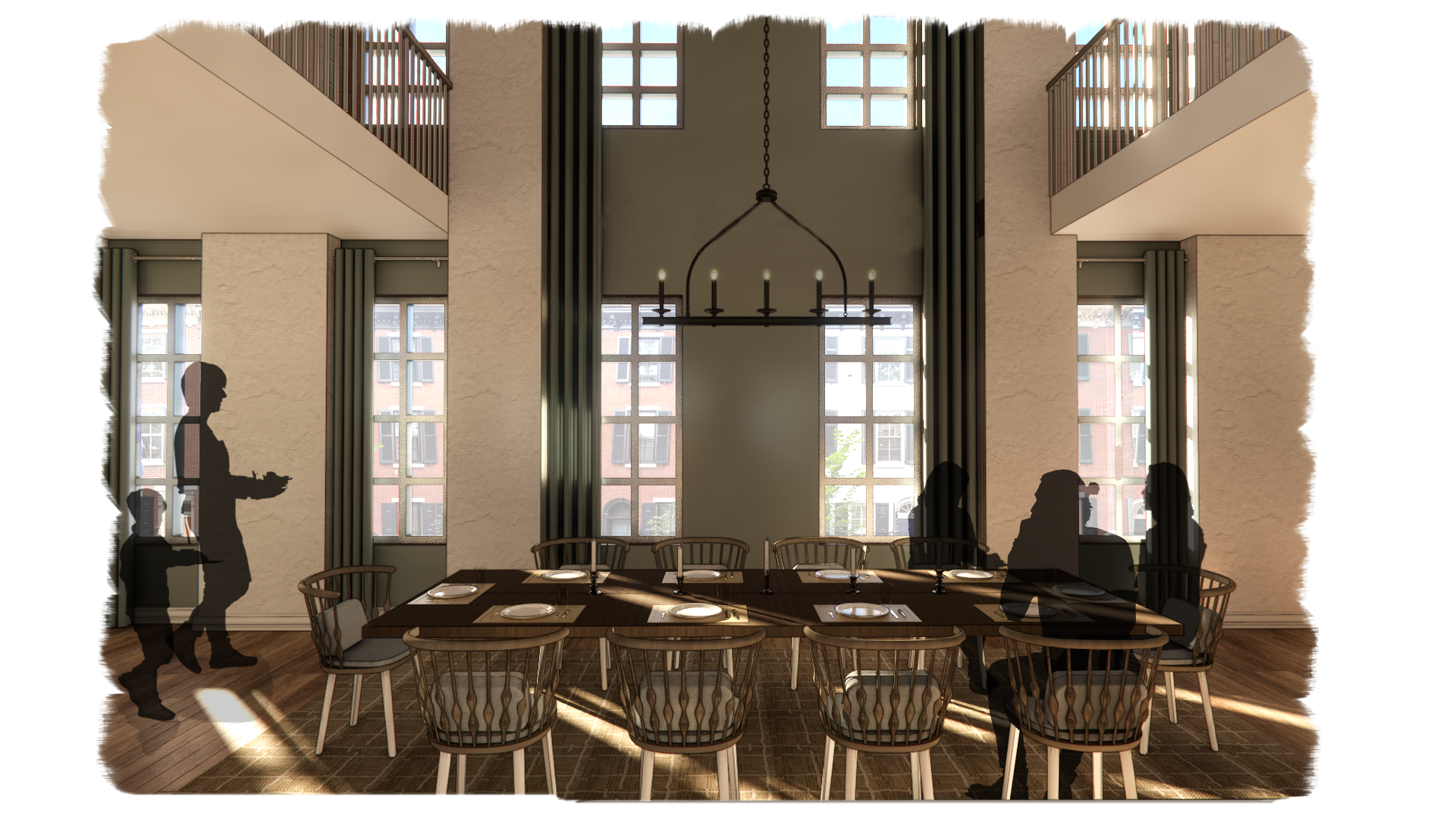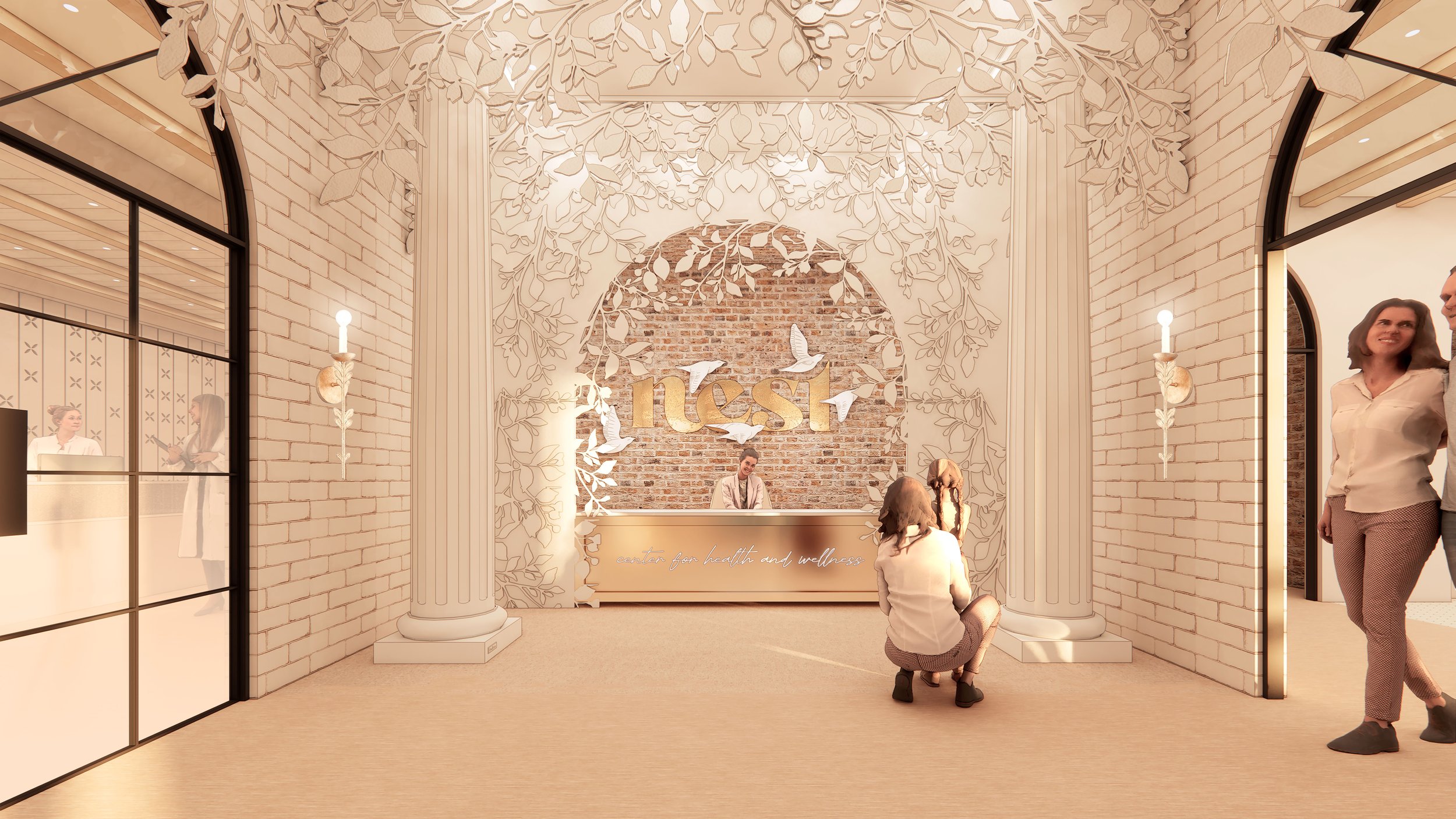Thesis Projects
Thesis Projects by Year
Navigating New Realities: The Role of Community Wellness Hub in Crisis Scenarios
Pandemics, climate crises, and sociopolitical upheavals disrupt traditional structures, leaving individuals and communities in prolonged states of uncertainty. Emotions are heightened, perceptions are altered, and memories may be distorted. These are moments of uncertainty, when past identity may not serve, and future identity is yet to be realized. In these moments, civilians rely on frontline workers for support and refuge. While they offer unwavering support to us during the crisis, who are the ones taking care of them? As frontline workers deal with multiple crises during their lifetime, they are in a constant state of liminality - caught between processing past experiences and confronting new challenges. Despite their critical role at the time of crisis, frontline workers frequently encounter substantial obstacles in accessing mental health support. The thesis explores how existing liminal spaces can be designed to offer a therapeutic environment to help frontline workers adapt to change, regain stability, re-discover their identities, and provide a space for the community in anticipation of future crisis events.
Hamilton Lofts: Home for Creative Expression on Avenue of the Arts
Art is both an individual and social practice. Individual, in that privacy allows the artist to reflect, focus, and experiment freely. Social, in that shared spaces like galleries, studios, and performance venues facilitate interaction and connection. A balance of these two environmental conditions is the crux of optimizing creative flow. Artists will always create despite limitations; however, this thesis examines how refining access to live-work space can benefit artists and musicians, with a focus on integrating communal areas to foster stronger connections with neighbors, and flexible private studio spaces that prioritize artists’ individual needs. Through considered porosity of views and customizable furniture kits, the design strategy aims to create thresholds that encourage informal exchange and lateral learning—where ideas are shared across disciplines and experience levels. These design decisions promote a culture of collaboration and a sense of belonging, establishing the foundation for a vibrant and connected creative community
Substance Addiction Recovery: Interconnecting Community, Environment, and Technology
Addiction is not merely a personal struggle; it is shaped by environmental and social forces that often lead to isolation and weakened community connections. In recovery, fostering social relationships is crucial, as shared experiences encourage openness and lasting bonds. Digital communities also play a vital role, enabling individuals to build meaningful connections across distances while expanding support networks and perspectives. This thesis introduces a new model for addiction recovery centered on community, connection, and healing. By integrating inpatient and outpatient care, it fosters stability and continuity, helping individuals build lasting relationships while easing transitions between structured support and independent living. By integrating technology and thoughtful design elements—fostering familiarity, safety, and a sense of control—this model creates environments that feel hopeful and empowering, reshaping recovery spaces into places of growth and optimism.
Children's Joyful Hospice Care to Feel Like Any Other Child
Children's hospice care is dedicated to providing compassionate and comprehensive support to children facing life-limiting illnesses with a prognosis of six months or less. This thesis proposes a groundbreaking design concept for children's hospice care, prioritizing individualized care and emotional support through the integration of nature, flexible spaces, vibrant aesthetics, and holistic sensory elements. By creating a sanctuary where children can rediscover the joys of childhood, even in the face of serious illness, the design aims to nurture the well-being of every child while providing unwavering support to families and caregivers. The proposed concept seeks to transform hospice care into a place of joy, comfort, and positive memories for both children and their families, emphasizing holistic sensory wellness, community engagement, and compassionate design principles.
There’s No Place Like Home: Uniting Generations, Celebrating Cultures, and Embracing Expression
The foundation of my thesis is grounded through the central theme of the concept of “home” as it’s understood through the lens of cultural traditions. A person’s home acts as a source of emotional security, comfort, and a profound sense of belonging. It serves as the foundation for building relationships and creating memories. My thesis outlines a study that seeks to deepen our understanding of the concept of home through an exploration of cultural traditions passed down through generations. My thesis employs the theoretical framework of place-identity to examine how an individual’s sense of belonging is intertwined with their cultural heritage. By utilizing this concept, my thesis focuses not only to understand how cultural traditions contribute to individuals' sense of place-identity but also to actively create a space for the exchange and preservation of these traditions. This space is envisioned as inclusive and welcoming, fostering intergenerational dialogue and the sharing of personal narratives among individuals who share similar cultural values.
Beyond Birth: Crafting Supportive Postpartum Environments
There are 3 million pregnant women in the United States each year, and many feel like candy wrappers: packaging to be discarded after use. American apathy towards the female experience after birth is reflected in our lack of standardized postpartum care. This has contributed to one of the highest maternal death rates among the developed world, with more than half occurring after birth. According to the WHO, many of these deaths are preventable with proper postpartum care. This thesis explores the role of interior design in providing this crucial support, aiming to improve outcomes for both mothers and infants.
The Nature of Choice: Redefining Curative Environments through Natural Connection, Place Identity, and User-Controlled Experience
Clinical healthcare settings now place an emphasis on restorative and healing environments as a desired mode to curative care. This can be achieved through the incorporation of three foundational principles which promote healing within curative environments. The three foundational principles to achieve this include human connection to nature, place identity, and user-controlled experience. To successfully create curative and healing environments that help supplement conventional approaches to medicine, healing, and human well-being, is the direction I have explored in my Interior Design thesis. My thesis aims to define the opportunities behind creating a patient centric and patient controlled environment that promotes holistic approaches to medicine by bridging the gap between conventional medicine and alternative therapies. This investigation seeks to promote a curated and self-guided journey for both the patient and their support teams while carefully considering the treatment paths that each patient experiences. It is my goal to embrace the human connection to nature and the utilization of patient-controlled experiences to create a positive journey to healing.
Promoting Well-Being Through Empathetic Design
Empathy is the action of understanding and being aware of others' experiences. The word empathy directly translates from German as "in feeling." This definition of empathy is the process of projecting into another person to understand them fully. This is the starting point for empathetic design. Empathetic design is a design strategy that aims to understand the lives and experiences of users through immersion and then apply that understanding of the user throughout the design process.
This thesis employs empathetic design practices and strategies for well-being by focusing on spaces that enhance feelings of connection, comfort, and belonging. The Nest is a community center for mothers that utilizes these concepts. It is a nurturing environment for mothers that aims to bring mothers together in a healing environment that gives them space to focus on their well-being.
A Home at the End of Life: Designing for End of Life Care
Modern hospice care design is currently made up of four building typologies, including a wing within a hospital, a building connected to a hospital, an independent facility, and at home care. These current typology designs are deficient in the care of both their patients and their patients’ families and caregivers. There is a current culture of silence around death that can be read in these typologies and instead of making people feel at home, they produce undue stress, anxiety, and isolation. My thesis project challenges the current hospice care building environments by using architecture and design to improve end of life care experiences. My design will seek to enable and allow patients to live their life to the fullest through the engagement of the senses, creating a sense of home and community, and creating spaces that metaphorically and physically assist and guide patients and their families through this final journey.
Design Strategies for Tackling Homelessness and Food Insecurity: A Comprehensive Approach (Copy)
Homelessness and food insecurity are issues in every metropolitan area across the United States. Current solutions only offer temporary answers, which is not a sustainable way of thinking. Prioritizing the people and the community needs is a way to begin to understand better design strategies for long term solutions. A new way to start thinking about designing a permanent residence and providing food security is by creating spaces that provide safety and security to aid in comfort and recovery, fostering a community to work together to address these issues, and make the system a sustainable one to break the cycle of homelessness while helping the environment for which they inhabit.
Conveying Place, Atmosphere, and Experience through Visual Representation
Understanding the process & experience of recovery for substance abuse disorders, and how to design and visually represent an atmosphere of comfort, healing, and connection to nature in a rehabilitation facility.
Community Housing Futures: Co-Designing Permanent Supportive Housing through a Trauma-Informed Lens
Housing has been transformed into an industry, rather than a right, which has made it increasingly difficult for marginalized communities to obtain and sustain viable housing. Housing insecurity is an ongoing crisis that intersects with the built environment by presenting a unique list of needs that interiors programming and design could better address through trauma-informed methods.
Using Light to Shape Aesthetics, Comfort and Mood
This thesis project will explore the relationship between light and aesthetics, comfort and mood. I aim to work with light, including temperature and luminosity, to enhance mood and create a sense of comfort in different spaces and times. I am especially interested in empathetic technologies that allow for dynamic adjustment of light based on individual preference and need.
Healing Through Nature: Exploring the Natural Environment’s Impact on Human Health
It all begins with an idea.















